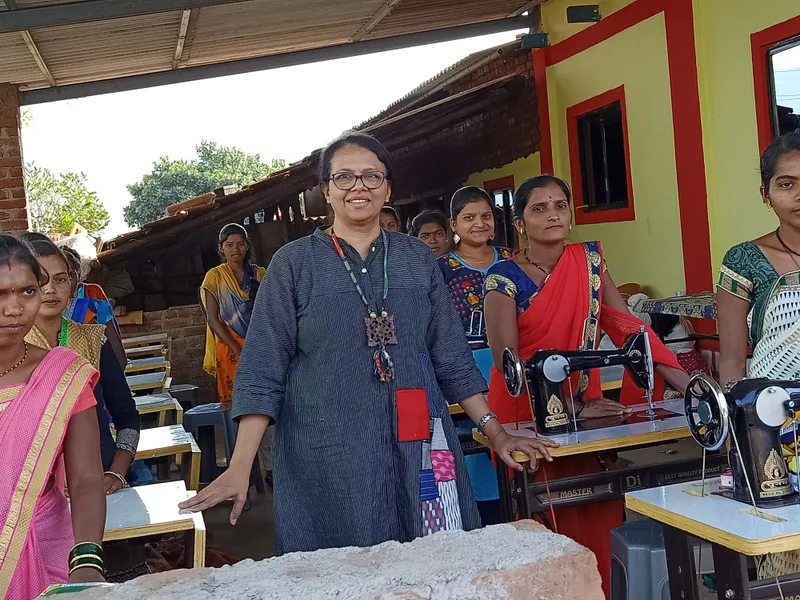This eco-friendly and upcycled clothing and home décor brand makes trendy fashion sustainable in every way
Mumbai-based Bunko Junko upcycles scraps of discarded fabric into unique fashion and home décor items, while saving the planet and providing economic opportunities to women in need.
The fashion industry’s constant churning to keep the wheels of commerce running, has wreaked havoc on our environment. Fortunately, a few visionaries have made it their mission to reverse the damage done so far. Mumbai-based founded by Bhavini Parikh in 2017 is one such eco-friendly upcycled fashion brand, working to make a difference.
“As a textile artist and fashion designer, I was interested in learning about sustainable ethical fashion. I saw infinite opportunities in the incredible amount of waste fabric we would end up with in the process of creation. I wanted to reduce the amount of waste, while maintaining high standards of design and production. In the last few years, my work’s focus has been entirely on converting scraps discarded on the cutting floor into commercially viable products using environmentally friendly upcycling and manufacturing methods,” explains Bhavini in a chat with YS Weekender.
The background
Textile artist, fashion designer, social entrepreneur, and creative director - Bhavini has worn many hats over the 29-year span of her career. She graduated from the SVT College of Home Science in the SNDT Women’s University with a degree in Home and Resource Management in the year 1987.
The desire for showing her creativity to the world led her to work on textile surface ornamentation such as embroidery. She hired and trained over 1000 women living in her locality for this business and contributed to their socio-economic development.
Before long, she launched her own clothing line called BN Fashion along with her husband, through which they made garments for brands like Vira, Ethnicity, Handloom Emporium, Aari, Maaya Clothing, among others. That was when she was introduced to the immense waste fabric that was an unfortunate result of the production process.
She began to creatively reuse the scrap material to make garments, home furnishings, and other innovative pieces to be displayed at exhibitions, which led to the launch of Bunko Junko. The word Bunko means art decoration in Japanese and Junko is a play on the word junk.
“Bunko Junko is about innovating means and methods to save landfills, energy, and water and ultimately support sustainability. We are devoted to textile upcycling by designing a business model that is environmentally conscious, and by hiring the under-skilled youth and women of our community, we are working towards improving their livelihood through sustainable income-generating activities. We only have one planet, and it is up to us to make it better however we can – and that is our mission now, and in the future,” exclaims Bhavini emphatically.
Social welfare
Apart from their core philosophy of upcycling discarded materials, the five-member core team of Bunko Junko prides itself on providing employment opportunities to women in need, allowing them in turn to contribute to their family income and become self-reliant while working from home and caring for their children and aged parents.

Bhavini with the women workers
Currently, they are training 50 residents of three villages in Karjat in Maharashtra, and commissioning patchwork from workers in villages of Gujarat.
“In the last 29 years, I have trained over 5000 women from Virar to Colaba in Mumbai, and as far as Gujarat. I’m elated when these women relate their personal success stories to me, where they have also been able to educate their children who have gone on to become Engineers and CA’s,” beams Bhavini with pride.
Other social welfare initiatives undertaken by her include making students aware of entrepreneurship opportunities at both the local and national level stage.
They also recently put up an art installation at the Kalaghoda Art Festival highlighting the importance of upcycling textiles to deal with increasing overflow of landfills and saving the oceans from the effects of fast fashion.
The products
Bunko Junko attempts to blend the concepts of sustainability with innovative design. Bhavini shares, “We design, deconstruct and develop chic garments using industrial waste, dead stocks and sustainable material. This means that each one of our products has its own story and no two garments are the same.”
Their design process is built on the philosophy that their clothes should be comfortable and utilitarian, made with upcycled materials in keeping with their zero waste policy. Everything from production is put back into use through various kinds of patchwork, knitting
of back fabrics, or through unique accessories.
“We hope to recreate the fashion industry, and make textile upcycling a globally accepted practice. One day, we would like Bunko Junko to become the best upcycled clothing brand producing clothes on an industrial level. We want to be a household name both for our environmental sustainability measures as well as our focus on socio economic development,” she explains.

Apart from clothing, Bunko Junko creates and retails home furnishings, accessories, toys, masks, as well as awards and lanyards for corporate events. Festive specialities include Christmas tree decorations and festive wreaths, among others. Their most popular products however, are their jackets which can be worn in a variety of ways and are one of a kind.
Products are retailed on their website bunkojunko.com, as well as on different online platforms like LBB, World Art Community, Upciclo, Flipkart, Amazon and others. They can
be shipped anywhere in India or abroad. They are priced within a range of Rs 799 for smaller decoration items and go up to Rs 3500 for jackets and other fashion items.
The growth story
According to a report published in the Business Research Company, the global ethical fashion market size reached a value of nearly $6.35 billion in 2019, and is expected to grow to $8.25 billion in 2023 at a CAGR of 6.8 percent. This growth is mainly due to the growing awareness about using ethical fashion for sustainability.
The report also states that countries like India and China adopting sustainability measures have spurred the growth further. It highlights that in August 2019, the government of India launched a project called SURE which aims to move towards sustainable fashion contributing to a clean environment.
Bunko Junko has also committed itself to this goal. Having started out with a minimal investment of Rs 5000, they have seen widespread growth, by relying on social media and sharing knowledge with the engaged and concerned youth of the country.
When asked about competitors, Bhavini names Doodlage. However she believes that her work stands apart as Bunko Junko’s offerings fall into a more affordable category.
Touching on plans of future expansion, Bhavini shares, “We are thankful to our well-wishers, as their support and guidance has helped us a lot. We had taken space to open in the Orbit Mall in Mumbai but due to the COVID-19 setback, we have not been able to take that off the ground yet. However, we are opening our one of a kind store on August 16, 2022 in Mumbai.”
Edited by Anju Narayanan







